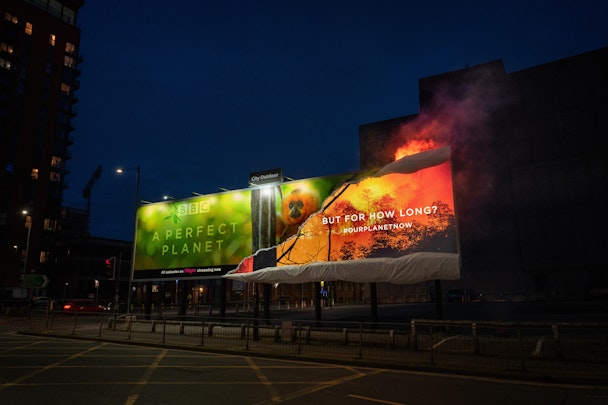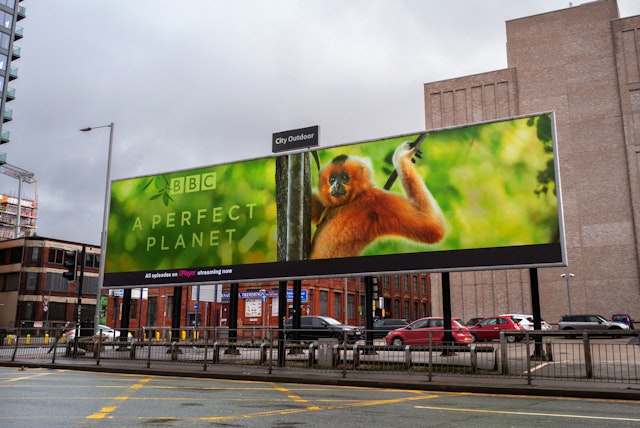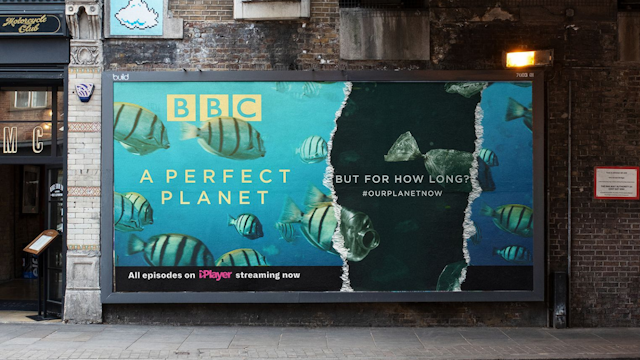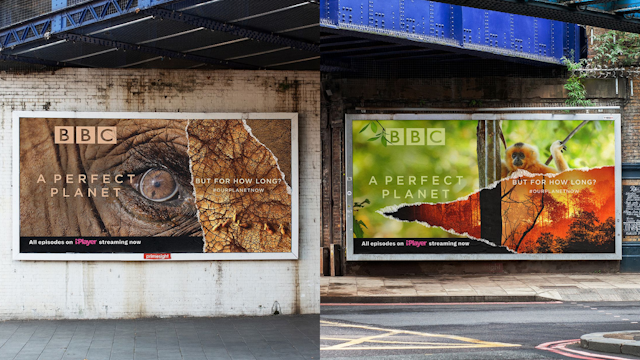
Advertisement

Perfect Planet billboard
To continue the climate conversation Sir David Attenborough started in the finale of his series ‘A Perfect Planet’ this weekend, BBC Creative hijacked its own billboards to demonstrate how humans are a destructive force on the planet. The creatives behind the viral success explain how out-of-home can still have an outsized impact, even when everyone is stuck indoors.
In the finale of 'A Perfect Planet' this weekend, Sir David Attenborough served a stark warning about the future of our planet, naming humans as its most destructive force.
While most 94-year-olds would be enjoying their retirement in peace, Attenborough is intent on using all his might to warn the human race about the impending climate crisis, before it’s too late.
When the BBC Creative team was first delivered the task of promoting this new series, it soon realised the brief was thicker than usual. “The BBC wanted it to be a bigger campaign focusing on the climate change, to tie into its new climate change programming,” shares creative Michael Tsim.
“It wanted us to create a moment leading on from the series. So, while we did the usual series trailer and campaign, we also got to have fun, by subverting it and doing something different.”
The BBC has a long history of inspiring nature documentaries, designed to leave viewers marvelling at the miraculous world in which we live. The stars of the show are natural curiosities, like the Suriname toad that gives birth from its back like an inverted bubble wrap, or the green basilisk lizard that can run on water.
But as the climate threat increases, the BBC has dedicated more time to the Earth's fragility and the need to preserve these wonders, so that documentaries like 'A Perfect Planet' can continue to exist.
Which is why James Cross, creative director at BBC Creative, says the campaign has to shock. “It needs to highlight the fact that BBC nature series aren't all about the good stuff, the wow and the wonder. There is actually a serious message that in more recent times, the corporation is leaning towards," he insists.
And so in November, the team at BBC Creative along with Talon Outdoor got to work, promoting the series via a number of posters erected across the UK. Just your straightforward billboards, featuring cute animal stars repurposed from the series. It also created a lengthy trailer, covering the four episodes the series - oceans, volcano, the sun, humans and weather.

The team then devised a stunt that would take place at the end of the series, where they would hijack the billboards, and seemingly rip them up to signify how humans have the potential to tear this planet apart.

The creatives admit that sifting through the bank of imagery provided by the A Perfect Planet team was a long process. Not only were they looking for the right imagery to convey what they needed to say in the first set of posters, but they needed it to dovetail perfectly with the harder-hitting imagery.
"We tried lots of different fish and various shots of bears," recalls Tsim. "And we experimented working with designers to get the matching right. The fish had to match the bottle, and the monkey's tree had to fir with the burning forest, to make the most impactful. So it took some time to get the right framing for all the different formats."

In one site, the billboard has been designed to make it look like it has been set on fire to boldly illustrate that wildfire destroys habitats – a performative stunt that works in a similar way to BBC Creative's award-winning Dracula billboard.
While Cross acknowledges such stunts are far from "house style", he says they allow the corporation to make the most of limited budgets. "So our strategy is to make huge noise around one site. If we put a lot of theatrics around it, it becomes bigger, and the return on investment is huge for us."
This is why the UK's lockdown doesn't stymie the impact of the outdoor spots, which fewer will people will see in the flesh. "The PR value in doing an execution good enough to be talked about and shared online far outweighs any installation costs. It's already had way more column inches than the average TV commercial," he claims.
It did take some convincing, however, to get Talon Outdoor on board with the smoke machine idea. After all, a smoking billboard is a sure fire way to increase calls to the Manchester fire department. "A lot of production went into this core idea. We had to really push it. The craft of OOH is the lengths you're willing to go to," Cross says. A robust risk assessment was therefore carried out ahead of the billboard going up, and the Greater Manchester Fire and Rescue Service was fully briefed about the use of a smoke machine for 30 minutes on the site.
Another crucial factor was the nature of the flammable materials themselves. "Obviously, if we're doing a campaign to raise awareness about the climate crisis, we can't use reams of plastic," explains creative Rachel Miles. "So everything you see on that billboard is 100% recyclable."
The team used eco-friendly, non-toxic inks for all the printing, while the display panels and banner material were fully recyclable as was the timber used to build the frame. And for the smoke, an eco-friendly water-based liquid was used for the smoke machine element.
The final effect gives the observer the jolt they need but isn't so distressing they need to look away. Cross explains that applying the right amount of shock factor was crucial, pointing out that while the famous image of the burned koala bear raised awareness of the severity of the Australian wildfires, that kind of imagery would be too extreme for the BBC.
"We're not United Colors of Benetton. We can't really go for that shock factor, but we can play around with the images to shock people into action." But he highlights that since the last series, the team has seen something of a cultural shift as people get more comfortable with shocking imagery. "At the BBC, we're in a unique place where we can influencer popular culture, using shock tactics to do that," he adds.
Beyond the OOH campaign, the team also 'hijacked' the original trailer. To emphasise the severity of the message, Tsim explains the intention was to make the footage off balance. "While Attenborough warns viewers that humans are sending the planet off balance," he says.
And so, the BBC has brought the outdoors home for everyone stuck inside. A perfect OOH stunt to remind people about our perfect planet.